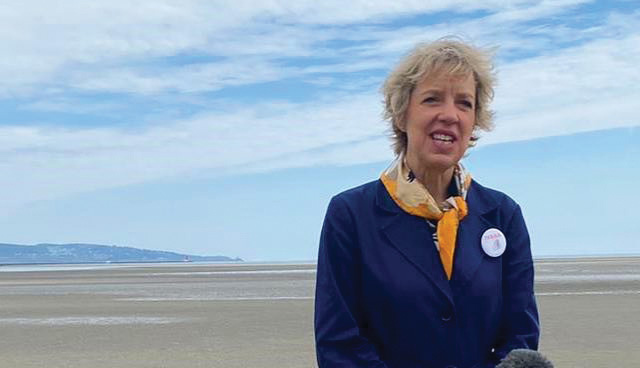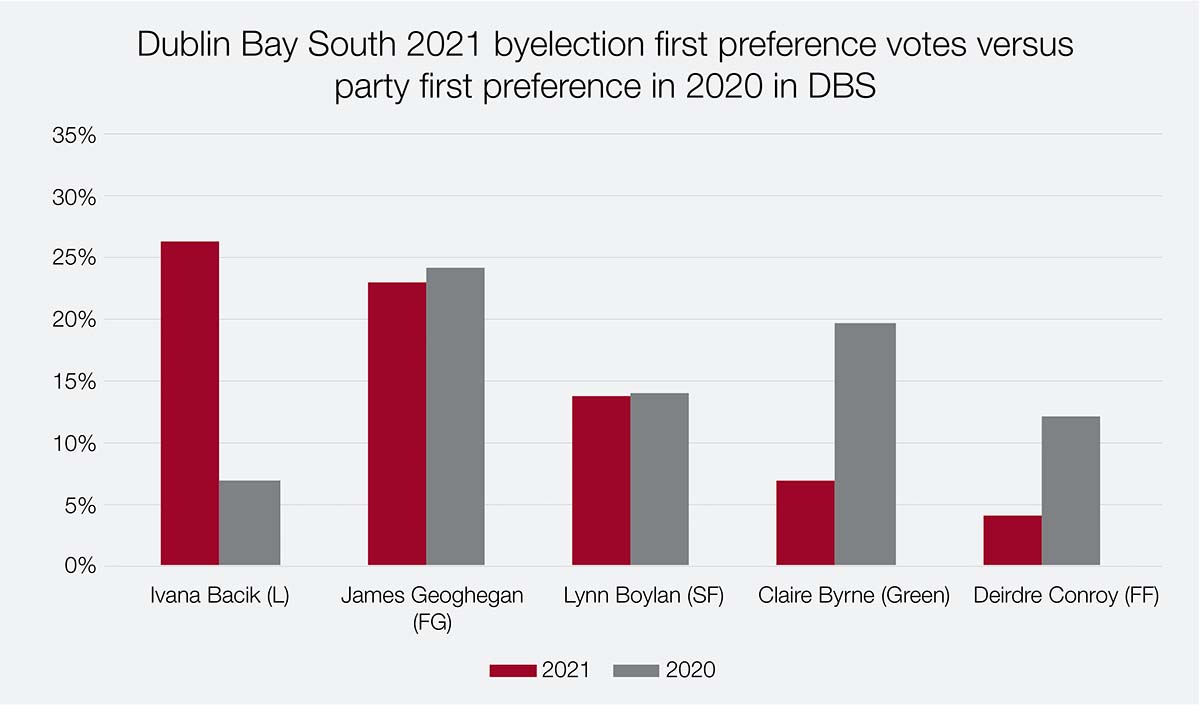Bacik wins Dublin Bay South byelection

After nine counts, Ivana Bacik of Labour was declared the Dáil’s latest Teachta Dála in July 2021’s Dublin Bay South byelection. The result, swinging a seat vacated by a coalition government member to an opposition party, leaves the tri-party coalition with a majority of just seven.
A seat in the four-seater Dublin Bay South constituency was vacated in April 2021 when Eoghan Murphy of Fine Gael, the former Minister for Housing, Planning and Local Government, announced his resignation from the Dáil in order to pursue a career in international affairs, taking up a position at the Organization for Security and Co-operation in Europe. Murphy, who had been Minister of State at the Department of Finance before taking up the housing portfolio, was not included in the three-party Cabinet that was agreed between Fianna Fáil, Fine Gael and the Green Party in 2020.
The Electoral (Amendment) Act 2011 stipulates that a byelection must be held within six months of a vacancy occurring. The writ was moved in the Dáil on 16 June 2021, and on the same day Murphy’s successor as Housing Minister, Darragh O’Brien TD signed the polling order for the byelection. The order set the polling date as 8 July 2021.
Constituency profile
Dublin Bay South covers notable Dublin townlands, districts, and settlements such as Ballsbridge, Donnybrook, Harold’s Cross, Ranelagh, Rathfarnham, Rathmines, Ringsend, Sandymount, Terenure and the south inner city. The area was mostly covered by the old Dublin South-East constituency until the creation of Dublin Bay South under the Electoral (Amendment) (Dáil Constituencies) Act 2013.
In its time as Dublin South-East, the area was known as a Fine Gael heartland, containing the seats of party leaders such as John A Costello and Garret FitzGerald. It has also been the site of the seats of other party leaders, such as Michael McDowell of the Progressive Democrats, Ruairí Quinn of Labour and is currently the base of Green Party leader Eamon Ryan. Ryan and Fianna Fáil’s Jim O’Callaghan were both elected in the constituency in the 2016 and 2020 general elections, with the other two seats in 2016 going to Fine Gael’s Murphy and Kate O’Connell. O’Connell was unseated by Sinn Féin’s Chris Andrews in 2020.
O’Connell’s unseating meant that Dublin Bay South was one of 12 constituencies out of a total of 39 to have not elected any women in 2020. Dublin Bay South has been labelled as “one of the most liberal constituencies in the country” by the Irish Times and “one of the wealthiest” by the Sunday Business Post. It had the highest vote in the 2018 referendum to repeal the Eighth Amendment and Dublin South-East had the highest vote in favour of marriage equality in the 2015 referendum with 74 per cent voting yes. Dublin South-East also had the highest vote against the introduction of the Eighth Amendment in 1983.
According to the 2016 Census, the population of the constituency is 121,176. This represents a 4.1 per cent increase from 2011, as compared to a national population increase of 3.8 per cent over the same period. 13.7 per cent of Dublin Bay South population were aged under 18 and 12.1 per cent were aged 65 and over in 2016, while the national measures were 25 per cent aged under 18 and 13.4 per cent aged 65 or over.

As of 2021, half of the adults in the constituency have been described as professionals, with 57 per cent having third-level qualifications and 44 per cent renting privately. A 2020 constituency profile compiled by the Oireachtas Library and Research Service found that 63.3 per cent of the constituency’s adults were “at work”, as opposed to a 53.5 per cent average in the State, and that 12.1 per cent were retired, compared with a State figure of 14.5 per cent. The profile also stated that 33.7 per cent of the constituency’s adults belonged to the managerial and technical social class, as opposed to a State average of 28.1 per cent.
The constituency has been marked by a consistently low voter turnout, with 54.8 per cent in 2016 and 52 per cent in 2020. This has partly been attributed to high rates of residential turnover in areas such as Ranelagh and Rathmines. Factoring in the lower than usual turnout typical of byelections, no more than 40 per cent turnout was expect. The final turnout figure of 34.7 per cent was, however, higher than the 26 per cent recorded in both the Dublin Fingal and Dublin Mid-West byelections in 2019.
Bacik elected
Ivana Bacik, a Labour Senator since 2007 and Labour’s leader in the Seanad since 2011, was elected to take the vacant seat on the ninth count, defeating James Geoghegan of Fine Gael after the votes of Lynn Boylan of Sinn Féin, who finished third, were distributed. Of the 26,882 valid votes cast, Bacik received 30.2 per cent of first preference votes, ahead of Geoghegan (26.2 per cent) and Boylan (15.8 per cent). Rounding out a top five were Claire Byrne (8 per cent) of the Green Party and Deirdre Conroy (4.6 per cent) of Fianna Fáil. Elected with 13,382 votes and transfers, Bacik did not reach the quota of 13,442.
The result will of course be welcome in Labour headquarters, with Bacik’s election lifting the party from the six seats won in 2020 (its lowest ever number of seats won in a general election) to seven, the same number it won in 2016, albeit still the second lowest number of seats the party has ever held. Elsewhere amoung the Opposition, Boylan’s 15.8 per cent first preference vote rate is largely consistent with that of Chris Andrews in 2020 (16.1 per cent), showing a new and solid Sinn Féin core within the constituency, but an inability to reach beyond that core.
For the Government parties, the result will be a worrying one. While Fine Gael recorded a first preference vote of 26.2 per cent, largely consistent with the joint 27.7 per cent received by Murphy and O’Connell in 2020, they are now seatless in a constituency considered by many to be their Dublin core. Fianna Fáil and the Green Party, competing in their leader’s constituency, would not have caught third-placed Sinn Féin even if both of their vote totals were combined. The result also decreases the majority held by the coalition government by one seat, with just seven separating the Government and the Opposition now.





